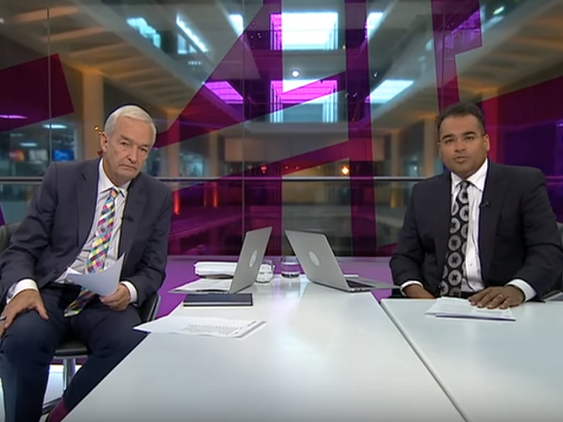
ITN has published its pay gap for ethnic minority staff, showing they are paid a fifth less than white employees, as it pledges to halve the gap by 2022.
The production company, which produces Channel 4 News, ITV News and Channel 5 News, is one of the first in the news media industry to publicly release its BAME (black, Asian and minority ethnic) pay gap.
It has a median BAME pay gap of 20.8 per cent and a median BAME bonus gap of 50 per cent.
This makes it worse than ITN’s median gender pay gap of 18.2 per cent, which was called “staggering” by Channel 4 News presenter Cathy Newman, and equal to the median bonus gender pay gap, also 50 per cent.
ITN said it has voluntarily released its BAME pay gap as part of “tough” new targets and an action plan to improve representation.
There is no legal obligation for companies to publish their BAME pay gap, unlike the gender pay gap legislation which came into force last year.
ITN’s mean BAME pay gap is 16.1 per cent. Its mean bonus gap is 66 per cent.
The company has announced “challenging” targets, including to halve the BAME pay gap by 2022.
ITN will also ensure at least one BAME candidate is interviewed for every role, at every level, effective immediately, a policy known in football as the “Rooney Rule”.
The BBC recently announced a similar policy to ensure shortlists for all jobs at Band E and above have at least one BAME person by the end of the summer.
ITN chief executive John Hardie, who is due to step down at the end of the year after nine years in charge, said: “As one of the first media organisations to publish its BAME pay gap, ITN is committed to being a diverse and inclusive place to work.
“We have made positive progress in terms of BAME representation in recent years but we have more to do to get where we want to be.
“To close this pay gap, we must work harder to increase the proportion of BAME people at every level of ITN, particularly in the senior decision-making management roles.”
Other diversity initiatives include unconscious bias training for all managers, reverse mentoring, a company-wide staff diversity and inclusion forum and an apprenticeship scheme focused on ethnically and socially diverse candidates.
Hardie added: “I am confident that these initiatives will significantly improve the overall diversity of ITN and the pay gap itself, creating a culture where everyone can flourish.”
ITN also wants to increase the representation of BAME employees from 15 per cent to 20 per cent by 2022.
Channel 4 News anchor Krishnan Guru-Murthy (pictured, right) tweeted in response to the pay gap publication, saying: The issue with most broadcasters and production companies is persistent failure to ensure staff from minorities are valued, developed and promoted rather than ignored or dismissed as too different, too troublesome or ‘not one of us’.
“But Rooney Rule recruitment at BBC and ITN will make a difference – as the huge array of talent out there will have the confidence to apply and recruiters will be forced to look at them properly. Then ethnic minorities will start getting those bold ‘left field’ appointments too.”
Freelance journalist Basit Mahmood also tweeted, saying it was a “brave step” for ITN to publish the figures, although ITV arts editor Nina Nannar said she was “disappointed” by the pay gap.
In defence of the policy for at least one BAME candidate to be interviewed for every job, ITV News anchor Charlene White tweeted: “Before the wave of abuse begins. The best person for the role will still get the job, irrespective of their cultural background/ethnicity.
“But they’ll be getting a seat at the interview table, and therefore getting a chance.”
The median pay gap is the difference between the middle salaries when put in numerical order, while the mean is calculated by adding all salaries together then dividing by the number of salaried staff.
Picture: Channel 4 News
Email pged@pressgazette.co.uk to point out mistakes, provide story tips or send in a letter for publication on our "Letters Page" blog
